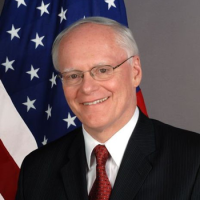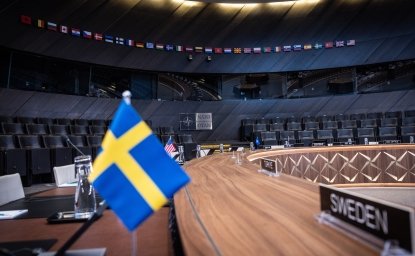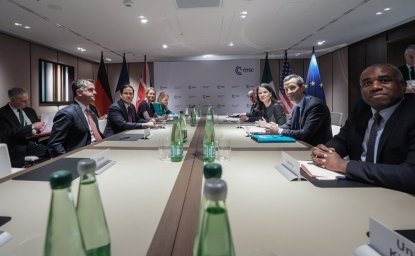Turkey’s rejection of NATO accession for Sweden and Finland, beyond undercutting NATO’s response to Russia’s aggression, reflects a deeper rift between the West and Turkey. This is further manifest by Ankara’s recent threat to expand into northern Syria and its overflights of Greek territory. For the sake of the Alliance, immediate responses are vital, but the rift will worsen unless Washington and European capitals work with Ankara to fundamentally shift their relationship. While such a shift has long been advisable given Turkey’s importance, the existential threat of Russian aggression for both Turkey and the Alliance make it urgent.
Almost overnight Ankara lashed out against Finland and Sweden, threatening to block their NATO accession if they did not cut real and alleged ties to the PKK.
A month ago, Washington hosted Turkish Foreign Minister Melvut Cavusoglu and signaled a new bilateral strategic dialogue. This included possible sales of F-16’s to Ankara, symbolically ending the bitter dispute over a Turkish Russian missile purchase, and Washington’s subsequent cutting Turkey from the F-35 program. Turkey was also following analogous rapprochement with Arab states, Israel, Greece, and Armenia, and now plays a central role in the Ukrainian conflict providing weapons, closing the Straits to Russian naval reinforcements and pressing on various diplomatic exchanges. Then almost overnight Ankara lashed out against Finland and Sweden, threatening to block their NATO accession if they did not cut real and alleged ties to the PKK, and followed up with the aforementioned threats in Syria and escalation in the Aegean. Predictably, American commentators reacted vigorously, even suggesting once again for Turkey to be thrown out of NATO.
Shifting attitudes toward Turkey
Such dramatic flips in Turkish policy, gelding any predictable diplomacy, have become a hallmark of both Turkish president Erdogan and the convoluted internal political system with his party, dependent on an extremist nationalist partner. Such flips also make efforts to resolve issues such as those above (let alone the underlying rift between Ankara and NATO allies), a high-risk endeavor which most Western leaders avoid, writing Turkey off as a lost cause. But as Ukraine has demonstrated, Turkey is vital to containing Russia, as it has been to NATO’s nuclear deterrence, missile defense against Iran, operations in the Balkans, and Afghanistan. It is just too big, too important, and at times too problematic to ignore.
While the Ukraine conflict is now generating strife between Turkey and NATO over Scandinavian accession, it also offers a chance to improve relations between them. That conflict resembles nothing seen since the late 1930s and immediate post-war period, with the very survival of the world order at stake. Winning this conflict, by maintaining Ukraine’s survival as an independent state and deterring new Russian aggression, while avoiding escalation into the unknown, is a categorical imperative not experienced since the Cold War. While this is true of the Alliance as a whole, it is especially relevant for Turkey, a front line state with a long history under Russian pressure.
Furthermore, experience shows Turkey can be cooperative. The Bush administration worked well with Turkey on counter-PKK operations, and the Obama administration negotiated a NATO anti- Iranian ballistic missile radar deployment. The 2019 Pence-Erdogan ceasefire in Northeast Syria still holds despite Turkish threats, and the two capitals handled well President Biden’s acknowledgment of Armenian genocide. And, ironically, despite deep geostrategic hostility and recent military clashes, Russia and Turkey maintain productive presidential-level relations, with Putin and especially Erdogan usually following a ‘no-surprises’ principle.
The Turks understand that accession of Sweden and Finland to NATO is critically important for a positive Ukraine outcome.
The Turks understand that accession of Sweden and Finland to NATO is critically important for a positive Ukraine outcome. They know it would strengthen the West’s long-term against Russian aggression and underline the solidarity of the international front against Moscow, without, as Putin admitted, directly threatening Russia. But what Ankara may not get is that its penchant for dangerous haggling, not only over accession but with its Aegean and northern Syria threats, undercuts that solidarity and the whole Russia containment categorical imperative. Turkey would then be blamed and likely ostracized permanently within NATO. So, the question is, why does it keep running such risks?
Turkey’s risks
Beyond the specific difficulties with President Erdogan and his domestic political and economic woes, underlying issues stymie cooperation; although they could be managed if understood better. Most immediate are Turkey’s concerns about its ‘near abroad’ security issues in the Caucasus, Iraq, Syria, the Aegean, and Eastern Mediterranean abutting Turkey’s access to the world. Above all, Turkey sees the Kurdish PKK insurgency as an existential threat. While its terrorism in Turkey has been largely suppressed, it has large bases in Iraq and Syria, including the PKK offshoot YPG commanding the Syrian Democratic Forces (SDF) in northeast Syria fighting with US and other Western support against ISIS.
Turkey understands but cannot politically accept this support to the SDF, as Ankara fears one day the Americans will leave, and the SDF will turn on Turkey. Likewise it sees Greece asserting legally unjustified positions in the Aegean and eastern Mediterranean as choking off Turkish access to undersea riches and eventually even international air and sea communications. Finally it views Armenia as a hindrance to its alliance with Azerbaijan, with important energy and security benefits and linguistic and ethnic ties.
Making everything worse, Turks, drawing on their 19thcentury great power experiences, fear that powerful real or potential foes will exploit these near abroad dangers. They point here not only to Russian support to Armenia but Iranian collaboration with PKK elements in Iraq and Syria. They also see US and other Western, notably French, military arrangements with Athens as aimed at them, citing Washington’s and Paris’s criticism of Turkey’s actions while ignoring Greek sins (its troops on Aegean islands demilitarized in various treaties, illegitimate air space claims, and Law of the Sea provisions imposed on non-signatory Turkey).
These near abroad security issues predate Erdogan and are hard-wired into Turkish foreign policy and popular sentiment, but because of the often irritating way Ankara presents even reasonable arguments, Washington and European capitals dismiss or belittle them.
This problem is compounded by Washington’s difficulties, understanding that if it wants states to support its global security agenda against Russia or China, it has to take those states’ immediate security concerns seriously. This includes not just Turkey but, for example, Saudi Arabia and the UAE with Iranian-backed Houthis in Yemen. Furthermore, Turkey’s near abroad opponents, the PKK movement, Greece, and Armenia, have strong diaspora lobbies in the US and Western Europe who effectively portray Turkey as an eternal enemy regardless of Ankara’s policies, even those which at times accommodated Kurdish, Greek, and Armenian interests.
Compromise, horse trading, and just saying no, staples of most diplomacy, are often seen on all sides as betrayals of NATO solidarity, Western values, and past contributions and sacrifices.
Finally, achieving productive, transactional deals between Ankara and the rest of the West, such as those cited above, is undercut by “band of brothers” thinking in all the relevant capitals. Compromise, horse trading, and just saying no, staples of most diplomacy, are often seen on all sides as betrayals of NATO solidarity, Western values, and past contributions and sacrifices. Most bilateral meetings with Ankara begin with long-winded recitation of what the other is doing wrong, with a naïve expectation that the other, if harangued enough, will stop doing things truly important to it, such as Ankara’s maintaining a complex relationship with Russia or Washington’s fighting ISIS with whatever partner works.
A new course
The first step out of this dilemma is for all sides to recognize that with Russian aggression, they face a unique international situation that requires subordination of all other priorities to the core objective. That sort of wisdom, familiar to Churchill, Roosevelt, Truman, military planners, and in a perverse way, Putin, has largely faded in the West since 1989, replaced by what has become conventional foreign policy thinking: nothing is critical and innumerable factors compete for consideration, for example moral, ideological, humanitarian, domestic, security, alliance, economic, personal, or usually some triangulation of them.
Both sides must prioritize vigorously containing Russia, seek transactional deals on those issues between them that can be resolved, and ignore the others.
In the impasse between Turkey and NATO, this conventional thinking encourages states, buffeted by various interests and negative voices towards Turkey, to treat it as a second class, suspect member of the alliance, while benefiting from its extraordinary NATO contributions. But conventional thinking also pushes Ankara, with its domestic pressures, to see the Ukrainian crisis as simply another opportunity to extort Europe over Turkey’s second-class status, EU accession, arms sales, and specific issues such as the PKK and the Aegean. Both sides thus must prioritize vigorously containing Russia, seek transactional deals on those issues between them that can be resolved, and ignore the others. In short, accepting partners as they are, not as they should be.
The immediate challenge is NATO accession. Here Turkey has to blink first and recognize that the stakes, not just stopping Russia but preserving its own relations with NATO, require accepting half a loaf (not always an Erdogan government trait). It cannot expect Sweden and Finland to extradite people to a state whose legal system is under continuous international criticism, nor for those countries to silence freedom of expression, even when it is sympathetic to the terrorist PKK cause. It should also be accepted that, while the fight against the PKK is truly important to Turkish security, it is still secondary to Russia advancing on its borders.
In return, Sweden should lift its ban on arms sales to Turkey (and the US Congress the same with its informal ban, now impacting the F-16 sale). Finland and especially Sweden, given their long affinity for “national liberation” movements, should cut official contacts with the PKK and its fronts, recommit to Helsinki Final Act on noninterference in others’ internal affairs and give assurances they would cooperate in NATO on issues important to Turkey.
Turkey’s partners should continue counseling it against a new incursion into northern Syria. But if Turkey compromises by only attacking PKK elements west of the Euphrates, away from US forces and the main anti-ISIS effort, Washington’s objections should be muted. Likewise, partners should urge Turkey to stop overflying Greek territory, but simultaneously speak out on provocative Greek policies.
While these steps can manage the immediate crises Turkey has launched, the longer-term solution, moving to a transactional relationship, needs highest level US leadership. First, such a relationship requires dealing with Erdogan; if Putin can do it with a geostrategic opponent, why cannot American and European leaders with an ally, however difficult, given the stakes. Second, the US needs someone at a very senior level to complement the American ambassador as the administration’s Turkish file lead, not to communicate with the Turks but to corral the undisciplined official and unofficial Washington policy worlds. That world can torpedo any foreign policy effort, but doing so regarding Turkey is child’s play in the absence of presidential engagement and a Washington champion.
None of that will make a difference, however, unless Turkey’s leadership recognizes it must change some policies and, more so, attitudes toward its NATO allies, whom at this point are all Turkey can count on faced with an existential threat from Russia.
The views expressed in these articles are those of the author and do not reflect an official position of the Wilson Center.
Author

Former ambassador to Iraq and Turkey, and Special Envoy to the Global Coalition To Defeat ISIS

Middle East Program
The Wilson Center’s Middle East Program serves as a crucial resource for the policymaking community and beyond, providing analyses and research that helps inform US foreign policymaking, stimulates public debate, and expands knowledge about issues in the wider Middle East and North Africa (MENA) region. Read more

Explore More
Browse Insights & Analysis
Trump Speaks with Putin in Effort to End Russia-Ukraine War

From Partner to Ally: Sweden’s First Year in NATO

“Security, Europe!”: Poland's Rise as NATO's Defense Spending Leader

